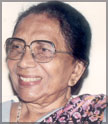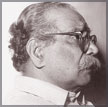|
DAILY NEWS ONLINE |
|
|
|
OTHER EDITIONS |
|
|
|
OTHER LINKS |
  |
Aristophanes on the Sinhala stage
Vedagathkama - the adaptation of Oscar Wilde’s A Woman of no Importance had quite a powerful cast, as I said earlier. We had Ruby de Mel as the Woman of no Importance in the title role and Felix Premawardhana in the other main role as Sir Edwin Ranaspathy, the arrogant aristocrat who had let down this woman long years ago. He meets her and her son (his son) Rohana Vidyapathy at Tamara Divakara’s (played by Somi Meegama) - his relative. The young man Rohana, meanwhile has fallen in love with Sandhya who is a frequent caller at the Divakara home.
The plot thickens as old Ranaspathy befriends Rohana (he is unaware that this is his father) and entices him to go abroad on a job offered by him. Ranaspathy tries to charm his way into Sandhya’s heart too. When Rohana discovers this villainy he tries to attack Ranaspathy. This is prevented by Sumana Vidyaratne who at that moment reveals the true identity of the man. It is a melodramatic end - typically ‘Wildish’ perhaps - but we enjoyed it immensely. Ruby de Mel and Felix Premawardhana were praised highly by the press for their sterling performances and Piyasena Gunatilleke for his ‘brief excellence’ by none other than ‘M.de S.’ - Mervyn de Silva. I would like to quote a little bit from his review that appeared in the Daily News of 9 August 1956. Genuineness“First things first. At a time when the correspondence columns of this journal can hardly accommodate the effusions of those who loudly profess a passion for the local theatre and a deep concern for its future it is sad, truly sad, to see a production of this kind receive such an unenthusiastic response...”
”When the favoured great are permitted to sell any roseate hogwash under the guise of theatre, a production such as ‘Vedgathkama’ has the minimal virtue of genuineness which in itself should provide sufficient recommendation....” ”Only Felix Premawardhana possessed, to my mind, the necessary savoir faire, and I have made allowance for the inexperience of many of the players.... Of the other actors I liked the brief excellence of Piyasena Gunatillake and the extremely confident manner in which Somi Meegama and Ruby de Mel handled their roles...” Dream worldTo me the credit titles of “Vedagathkama’ present even a happier picture. Look at this. Stage Set Designs - Douglas Amarasekera, Executed by S. Shanmuganathan, Make up by Quintus V. Saldin and Stage Management by K. K. Dharmapala. People speak of harmony. We had plenty of harmony at that time. ‘Vedagathkama’ was presented by Nava Natya Sabha - our new group, in aid of the Child and Youth Welfare Society whose President was Sita Seneviratne and whose patron was Sir Albert F. Peries. We had our initial run at the YMBA Hall on the 8 and 9 of August, 1956 (note, that Mervyn de Silva had written his review the very evening he had seen the play - most likely on August 9 and followed up with several repeats in Colombo and a few outstation shows at Moratuwa, Panadura and Wennappuwa etc. We were in our own dream world of adaptations and translations when, in November of the same year as we presented Oscar Wilde on the Sinhala stage, something of mighty proportions and import hit the Lionel Wendt stage in Colombo, like a thunderbolt. That was ‘Maname’! by Dr. Ediriweera Sarachchandra. He too had been dabbling with ‘adaptations’ most of the time and this time came out with a production that took the town, nay, the whole country by storm! Maname was the result of relentless research by Dr. Sarachchandra into the ‘roots’ of our theatre and his exposure to Kabuki and Noh theatre traditions of Japan. He had first staged his novel production in the Peradeniya campus premises and then, encouraged by the massive response, decided to bring it to Colombo. According to him (in private conversations with us) there was difficulty in selling the tickets in Colombo, at first. Some Colombo ladies who had been approached to buy a ticket had obliged the students by buying a ticket and declaring that they will send a domestic aid to see this thing called Maname! Maname had a first run of five days at the Lionel Wendt Theatre - I believe beginning 6 November 1956. Word had soon spread around Colombo’s ‘fashionable’ circles that ‘Maname’ was the thing and that it is a must for anybody who considered himself somebody. And the last two days of the first run and the subsequent re-runs could hardly accommodate the enthusiasm of the massive influx. Maname has since been hailed as the greatest and the most noble thing that happened in the post-independence Theatre of this country. It happened in the same year as that of the great ‘Sanga - Veda - Guru - Govi - Kamkaru’ revolution of S.W.R.D. Bandaranaike. Maname has survived up to date. I am not sure whether the same has happened as far as the ‘revolution’ was concerned. To my mind ‘Maname’ was the greatest thing that happened to us after C.W.W. Kannangara’s Free Education Act in Parliament. Enchanting smileI remember going to see Maname on all five days of its first run and being more and more bewitched and mesmerized by it each time I saw it. Some of us frequented the places where Maname was presented so much that Dr. Sarachchandra himself came to know us personally (He always stood quietly by a door or in the corridor, scratching his nose or engrossed in some thought) and started calling us ‘Manamaniacs’. “Ah, here come the ‘Manamaniacs’”! He would declare smiling his enchanting smile each time he saw us. At that time I did not imagine even in my wildest dreams that a year or two later I would be playing the part of Prince Maname myself! However that’s a different story and I will come back to it in good time. I mentioned Douglas Amerasekera a couple of columns back. He came back to see our ‘Manamalayo’ the very next day too. Subsequently he came to see ‘Vedagathkama’ too and called back-stage, to congratulate us. One Sunday morning he called at the place I was boarded in at Manning Town and asked me whether he could have a chat with me. Some of us were playing cards (304, I believe) at the time he arrived and he sat patiently till we finished the game. “Oh. Henry, how could you be playing a silly game like cards!” was his first response as we stepped into the lawn for his chat. He looked flabbergasted. I ignored his chagrin and asked him what the ‘chat’ was about. He then brought out a file full of papers in extremely neat and artistic handwriting and told me it was an adaptation of a play he had been working on and whether I would like to handle its direction. And that’s how I was introduced to the works of Aristophanese. This particular adaptation was that of a play called ‘The Clouds’ by the famed Greek playwright. Douglas had written the Sinhala words using the English alphabet and he apologised for not being able to write the script in Sinhala. I read through Douglas Amerasekera’s adaptation at leisure and found it to be very interesting and full of good home-grown humour. And so, our Nava Natya Sabha decided to bring Aristophanese to the local stage as our very next production. We called it ‘Atta Kumakda’ (What is truth) and launched into it almost immediately. I had to effect certain changes in terms of grammar and syntax to the script, but no major changes were made to Douglas’s adaptation. I would like to quote the first two paragraphs of Douglas Amarasekera’s note in our souvenir for the play: “In the 5th century, B.C., in a small city, Athens, there occurred such a flowering of the human spirit as the world has never seen before or since. Within the short space of fifty years there flourished thinkers like Socrates, Plato and Aristotle, statesmen like Pericles, artists like Phidias, dramatists like Aeschylus, Sophocles, Uripides - and, Aristophanes. Aristophanes is the great master of comedy, as Sophocles is of tragedy. He has left us a number of comedies which for brilliant wit, penetrating satire and sheer uproarious fun have never been surpassed. Of these ‘The Clouds’ is one of the most famous.” A random poem in place of “Thought of the Week” The Celebration Friends, relatives “Great” they said I smiled wanly “For more glory....!” Smiling faces I look heavenwards You Contact: [email protected] .................................. |
||
|
|



